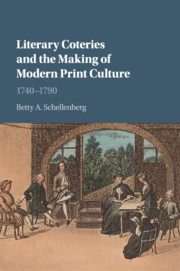Acknowledgments
A very early version of some of this book’s arguments appeared in a chapter entitled “‘The Society of Agreeable and Worthy Companions’: Bookishness and Manuscript Culture after 1750,” in Ina Ferris and Paul Keen, eds., Bookish Histories: Books, Literature, and Commercial Modernity, 1700–1900 (Houndmills and NY: Palgrave Macmillan, 2009), pp. 213–31, reproduced with the permission of Palgrave Macmillan. A penultimate version of my discussions of Hester Chapone’s and Catherine Talbot’s coterie lives, distributed through Chapters 1–3, was published as “Coterie Fame, Media Choice and the Writing Lives of Hester Mulso Chapone and Catherine Talbot,” Women’s Writing 21 (2014), pp. 316–36, and is republished with the permission of Taylor & Francis Group (www.tandfonline.com). Much of Chapter 7 first appeared in Eighteenth-Century Studies, Volume 44, Issue 2, 2011, pages 203–21. Copyright © 2011 The Johns Hopkins University Press.
I am grateful to the Social Sciences and Humanities Research Council of Canada, the Simon Fraser University (SFU) Publications Fund, and the SFU Department of English for generously supporting the archival research and manuscript preparation for this book. A series of outstanding research assistants watched over the project’s details and tied up loose ends: thank you to Emma Pink, Julie Karey, Jillian Snyder, Faith Dickens, Sarah Creel, David Weston, and Meghan Brennan, as well as to Maureen Curtin, who kept it all straight, as usual. Linda Bree, the longsuffering Anna Bond, and all the editorial staff at Cambridge University Press shepherded the completed manuscript through the evaluation and production stages with grace and care.
Librarians, archivists, and staff at the Huntington Library, the British Library, the University of Leeds, the Bodleian Library, the Bedfordshire and Luton Archives and Records Service, the Wellesley College Library, and the National Portrait Gallery have provided expert assistance and made their institutions wonderful places to work in and do business with. Research sojourns far from home have been made homier by the kind hospitality of Nicole, Rita, and Dearbhla, David F., Norbert and Susan, and especially Mark and Francesco.
While developing the argument of this book I have been humbled time and again by the generosity of my scholarly communities. Ros Ballaster, Jennifer Batt, Jim Bizzocchi, Clarissa Campbell Orr, Susan Carlile, Louise Curran, Leith Davis, Zoë Druick, Elizabeth Eger, Markman Ellis, Christine Gerrard, Patty Hamilton, Judith Hawley, Sören Hammerschmidt, Deborah Heller, Megan Hiatt, George Justice, Paul Keen, Kathy King, Michelle Levy, Margaret Linley, Jan Marontate, Emma Pink, Laura Runge, Anni Sairio, Norbert Schürer, Peter Stallybrass, and members of the Oxford Restoration to Reform group, the University of Leeds Eighteenth-Century and Romanticism group, the Elizabeth Montagu Network, and the Centre for Studies in Print and Media Cultures – all made invaluable suggestions at key moments in the project or provided feedback on chapters; I include those whose names I may have overlooked in my thanks. Eve Tavor Bannet and Margaret Ezell, as the Press’s readers, gave the gift of thorough and insightful responses to the completed manuscript. For all its limitations, this project would be much less than it is had I not benefitted from the erudition and attentiveness of these many colleagues.
In the course of my work I had the privilege, for the first time in my life, of becoming part of two literary coteries of my own. Karen Bowles and Pauline Doyle of the Society of Worms have managed to keep things light and supportive and challenging all at the same time. My colleagues Leith Davis and Michelle Levy fearlessly shared their own work and even more bravely read mine. Not only did they offer unfailing and generous encouragement, but they told me what this book was about. My debt to them cannot be overstated. And while I have been adding to the number of volumes on the shelves of the libraries of this world, Christian Couture has been building us one. He really doesn’t need another book, but this one is for him anyway.

